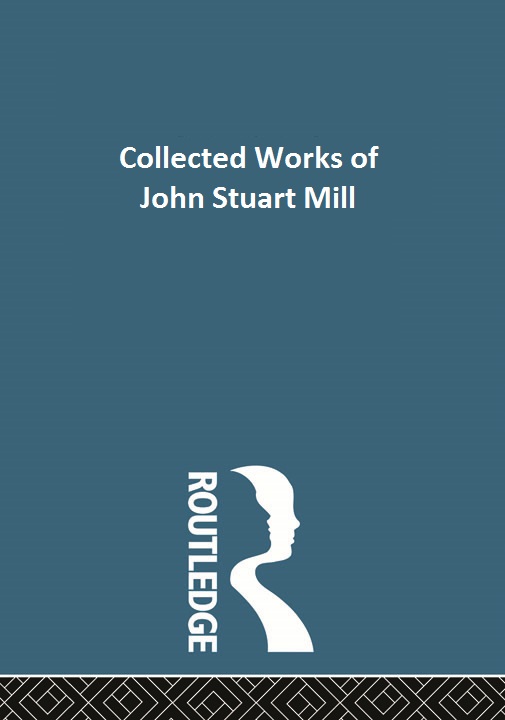
Collected Works of John Stuart Mill
Edited by John M. Robson
- Published: 1981
- DOI: 10.4324/9780415480581
- Set ISBN: 9780415480581
Set Contents
- Volume I. Autobiography and Literary Essays
- Volume II. Principles of Political Economy: with Some of Their Applications to Social Philosophy Books I-II
- Volume III. Principles of Political Economy: with Some of Their Applications to Social Philosophy Books III-V and Appendices
- Volume IV. Essays on Economics and Society
- Volume V. Essays on Economics and Society
- Volume VI. Essays on England, Ireland, and the Empire
- Volume VII. A System of Logic Ratiocinative and Inductive: Being a Connected View of the Principles of Evidence and the Methods of Scientific Investigation Books I-III
- Volume VIII. A System of Logic Ratiocinative and Inductive: Being a Connected View of the Principles of Evidence and the Methods of Scientific Investigation Books IV-VI
- Volume IX. An Examination of Sir William Hamilton’s Philosophy: and of The Principal Philosophical Questions Discussed in his Writings
- Volume X. Essays on Ethics, Religion and Society
- Volume XI. Essays on Philosophy and the Classics
- Volume XII. The Earlier Letters of John Stuart Mill 1812–1848
- Volume XIII. The Earlier Letters of John Stuart Mill 1812–1848
- Volume XIV. The Later Letters of John Stuart Mill 1849–1873
- Volume XV. The Later Letters of John Stuart Mill 1849–1873
- Volume XVI. The Later Letters of John Stuart Mill 1849–1873
- Volume XVII. The Later Letters of John Stuart Mill 1849–1873
- Volume XVIII. Essays on Politics and Society
- Volume XIX. Essays on Politics and Society
- Volume XX. Essays on French History and Historians
- Volume XXI. Essays on Equality, Law, and Education
- Volume XXII. Newspaper Writings: December 1822 – July 1831
- Volume XXIII. Newspaper Writings: August 1831 – October 1834
- Volume XXIV. Newspaper Writings: January 1835 – June 1847
- Volume XXV. Newspaper Writings: December 1847 – July 1873
- Volume XXVI. Journals and Debating Speeches
- Volume XXVII. Journals and Debating Speeches
- Volume XXVIII. Public and Parliamentary Speeches: November 1850 – November 1868
- Volume XXIX. Public and Parliamentary Speeches: July 1869 – March 1873
- Volume XXX. Writings on India
- Volume XXXI. Miscellaneous Writings
- Volume XXXII. Additional Letters of John Stuart Mill
- Volume XXXIII. Indexes to the Collected Works of John Stuart Mill
Volume Contents
-
Front Matter
-
Introduction By Joseph Hamburger
-
Textual Introduction By John M. Robson
-
Brodie’s History of the British Empire 1824
-
Editor’s Note By John M. Robson
-
Brodie’s History of the British Empire
-
-
Ireland 1825
-
Editor’s Note By John M. Robson
-
Ireland
-
-
The Game Laws 1826
-
Editor’s Note By John M. Robson
-
The Game Laws
-
-
Intercourse Between the United States and the British Colonies in the West Indies 1828
-
Editor’s Note By John M. Robson
-
Intercourse between the United States and the British Colonies in the West Indies
-
-
Notes on the Newspapers 1834
-
Editor’s Note By John M. Robson
-
Notes on the Newspapers
-
No. I, March, 1834
-
No. II, april, 1834
-
No. III, May, 1834
-
No. IV, June, 1834
-
No. V, July, 1834
-
No. VI, Aug., 1834
-
No. VII, Sept., 1834
-
-
-
The Close of the Session 1834
-
Editor’s Note By John M. Robson
-
The Close of the Session
-
-
Postscript to the London Review, NO. 1. 1835
-
Editor’s Note By John M. Robson
-
Postscript to the London Review, No. 1
-
-
Parliamentary Proceedings of the Session 1835
-
Editor’s Note By John M. Robson
-
Parliamentary Proceedings of the Session
-
-
Postscript: The Close of the Session 1835
-
Editor’s Note By John M. Robson
-
Postscript: The Close of the Session
-
-
State Of Politics In 1836 1836
-
Editor’s Note By John M. Robson
-
State of Politics in 1836
-
-
Walsh’s Contemporary History 1836
-
Editor’s Note By John M. Robson
-
Walsh’s Contemporary History
-
-
Fonblanque’s England Under Seven Administrations 1837
-
Editor’s Note By John M. Robson
-
Fonblanque’s England under Seven Administrations
-
-
Parties And The Ministry 1837
-
Editor’s Note By John M. Robson
-
Parties and the Ministry
-
-
Radical Party and Canada: Lord Durham and the Canadians 1838
-
Editor’s Note By John M. Robson
-
Radical Party and Canada: Lord Durham and the Canadians
-
-
Lord Durham and His Assailants 1838
-
Editor’s Note By John M. Robson
-
Lord Durham and His Assailants
-
-
Lord Durham’s Return 1838
-
Editor’s Note By John M. Robson
-
Lord Durham’s Return
-
-
Reorganization of the Reform Party 1839
-
Editor’s Note By John M. Robson
-
Reorganization of the Reform Party
-
-
What is to be Done with Ireland? 1848?
-
Editor’s Note By John M. Robson
-
What Is to Be Done with Ireland?
-
-
England and Ireland 1868
-
Editor’s Note By John M. Robson
-
England and Ireland
-
-
Back Matter